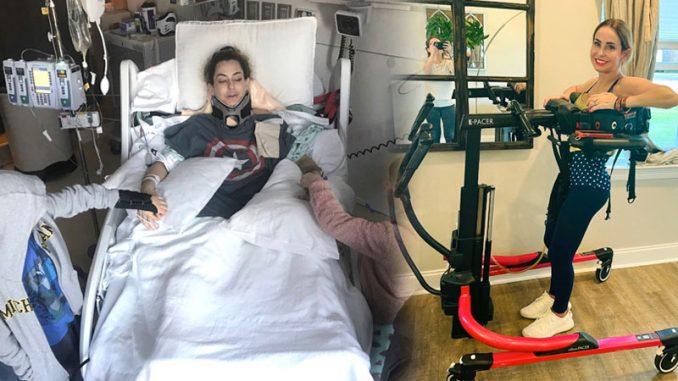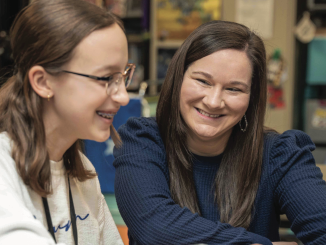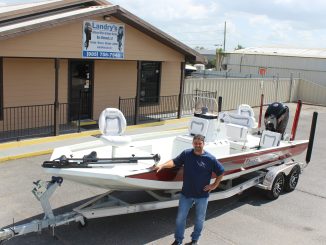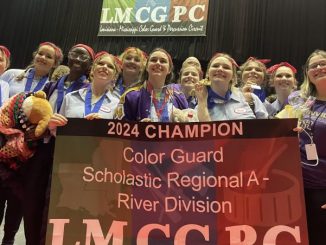
“You go from never stopping to ‘You’re never going to move.’ That’s mind-blowing information.”
It’s been nearly two years since Macy Lauren Ledet’s life was changed in an instant. On Feb. 21, 2020, an RV collided with her vehicle after she and her two children left a Houma parade.
Her children were injured, and Ledet was paralyzed on impact.
“I don’t remember much after I went unconscious, but when I came to in the hospital that’s when I couldn’t feel anything,” she said.
Ledet, who lives and practices law in St. Charles Parish, said the day after her accident she underwent her first surgery.
“After the surgery the doctor walked in and said, ‘I just want you to know I’m the person that operated on you and you’re never going to walk again. Do you have any questions?’” she remembers. “It was that abrupt. I was able to see my kids in the ICU to tell them, but once I was transferred to Touro I was there for months and COVID had just hit and so I couldn’t see them in the hospital. I had pictures of them on the ceiling because that’s the only thing I could see.”
Ledet said the months following the accident was the darkest time of her life.
“I had lost my work. I had lost my life and I had lost my kids,” she said. “It was a triple blow. For the first two or so months I wasn’t a very self-inspired person in the least. I didn’t want to get out of bed or go to therapy. It was one my therapists that told me, ‘If you don’t get out of this bed, they’re never going to let you leave and you’ll never see your kids.’ That was my wakeup call.”
Ledet was released from the hospital on June 17, 2020. She said her new way of life as a paraplegic could not have been different from her life before the accident.
“I don’t ever remember sitting down … ever,” she said of life before the wreck. “Even at my desk I would be standing up. I was a personal trainer … I ran marathons … I never sat still.”
Ledet said she dove headfirst into researching quadriplegics and any possible treatment options.
“After a month or so I was able to find other quads who were doing things,” she said. “That was the question that haunted me, ‘Is this true? Is my diagnosis true? Was I lied to?’”
Her research led her to a man who had done a study with the Department of Defense for a procedure called a nerve transfer – a procedure during which a surgeon takes a healthy, redundant, functioning nerve and reroutes it to connect to a nonfunctioning, damaged nerve.
Ledet had her first consultation in September 2020 and the first of three nerve transfer surgeries in Nov. 2020.
“The goal is to give someone more function,” she said. “I now have use of my arms and my hands, which they told me I never would.”
The most critical time for a nerve transfer is within the first year of the injury, which led Ledet to realize that she was discovering things about her own journey that she wanted to share with others who could use the information. She reached out to fil makers she knew, who picked up her story as a documentary project. It is slated for release this fall.
But Ledet didn’t stop there.
She found two clinics in the United States where the Department of Defense has been conducting walking studies on injured military using epidural stimulation. Just like the nerve transfer, it has a critical timeline.
After being rejected from the trial, Ledet was told epidural stimulation would be approved by the FDA in 2025.
“I told them I don’t have that kind of time,” she said. “So, I found a facility in Thailand when I learned how to walk. Again, something they told me I would never be able to do.”
Ledet spent last summer in a Guadalajara facility, where a stimulator was put on her spine right below the injury. Once turned on, the simulator allowed Ledet to stand, take steps, move her legs and her feet, move her toes and balance herself.
“The stimulator has to be one, but it creates frequency between your brain and limbs,” she said. “The more you do this the more it creates muscle memory. After three years you can see the full result.”
Ledet’s home is now equipped with a walking machine, and she practices walking and moving as much as she can to create new that muscle memory. And while Ledet said there is no cure to paralysis, what she has discovered is synonymous to a cure.
Her goal through making the documentary, Ledet said, is to take people through the processes she went through in her recovery and to teach people how to do the same – including how to draft documents to their insurance companies to fight appeals processes.
“Were make people more independent and not dependent on the government and insurance companies,” she said. “We’re trying to create an avenue to where the knowledge is free. No one was ever going to tell me these options existed.”
In addition to work on the documentary, Ledet has held the state title of Ms. Wheelchair Louisiana USA for the past two years, a cause she said she got involved with to broaden her platform and to reach more people. Through the pageant Ledet has worked closely with The Dane Foundation, a nonprofit which helps provide services and equipment to disabled people all over the country.
Ledet is also working with U.S. Rep. Troy Carter on accessibility in the workplace – specifically in law buildings and court houses.
“My next mission is that at our next legislative session this just gets brought to the floor,” she said.





macy is my stepmom, she is doing very great! just letting you know.
she is my stepmom, just letting you know she is doing great
she is my mother, she is doing amazing
\
stepmother*